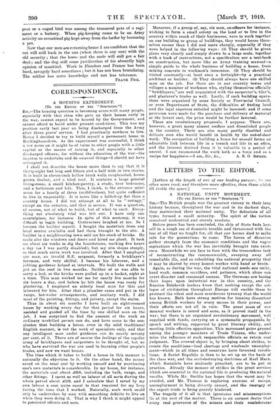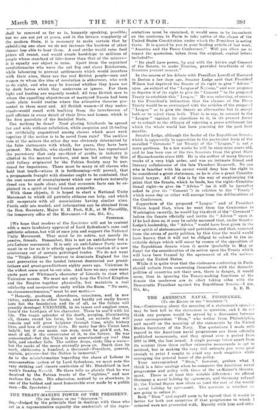LETTERS TO THE EDITOR.
[Letters of the length of ens of our leading paragraz h, ore after more read, and therefore more effective, than those which fill treble the space.] -- A NATIONAL UNITY MOVEMENT.
ITo sus EDITOR or THE .fferersroa."1
Sm,—The British people won the greatest victory in their long history because, throughout the war and in its darkest days, they maintained their national unity. The defeatists of all types formed a small minority. The spirit of the nation remained undaunted and sternly resolute.
Before peace has been concluded, the ship of State finds her- self in a rough sea of domestic trouble and threatened with the loss of all that we fought for, all that our heroes died to make safe for the generations to come. The forces of disunion gather strength from the economic conditions and the vague aspirations which the war has inevitably brought into exist- ence. Meanwhile we are face to face with the tremendous task of reconstructing the commonwealth, sweeping away all remediable ills, and so rebuilding the national prosperity that it may be shared by every honest worker with band or brain. Again, as during the war, the vital national needs are unity, hard work, common sacrifices, and patience, which alone can avert disaster and command success. The Germans are basing their hopes upon industrial war in this country, and the Russian Bolshevik leaders know that nothing except the col- lapse of civilization throughout Europe will enable them to protract the vilest and most murderous tyranny that the world has known. Both have strong motives for fanning discontent among British workers by every means in their power, and their efforts are not all in vain. The great mass of our manual workers is sound and sane, as it proved itself in the war; but there is an organized revolutionary movement, well supplied with funds, carrying on a systematic propaganda by speech and writing, supported by great literary ability, and meeting little effective opposition. This movement gains ground among the younger members of Trade Unions, who under- mine the influence of such responsible officials as retain cool judgment. The avowed object is, by bringing about strikes, to create the condition:a—food shortage and wholesale unemploy- ment—which in all times and countries have favoured revolu- tions. A Soviet Republic is then to be set up on the basis of the class war, and the soul-destroying doctrines of Karl Marx, which Socialists have zealously preached, are to be put in practice. Already the menace of strikes in the great services which are essential to the national life is producing the natural results. While Mr. Smillie has hopes that the worst may be avoided, and Mr. Thomas is exploring avenues of escape, unemployment is being directly caused, and the reeevmry of the export trade is being gravely hindered.
The tragedy of it all is that ignorance and misconceptions lie at the root of the matter. There is an earliest desire that every real grievance of the miners and their confederates
shall be removed as far as is, humanly speaking, possible; but we are not yet at peace, and in the intense complexity of the modern State, it is necessary to make certain that by subsidizing one class we do not increase the burdens of other classes lees able to bear them. A coal strike would raise food prices all round, and would create hardships to millions of people whose standard of life—lower than that of the miners— it is equally our object to raise. Apart from the organized revolutionaries who wave the red flag and cheer Bolshevism, while labouring to prevent settlements which would interfere with their aims, there are the real British people—men end women to whom the idea of revolution is abhorrent, who wish to do right, and who may be hurried whither they know not by dark forces which they underrate or ignore. For them light and lending are urgently needed. All true British men to whom the appalling object-lesson of martyred Russia had been made plain would realise where the attractive theories pre- sented to them must end. All British women—if they under- stood—would recoil with loathing from the interference of paid officials in every detail of their lives and homes, which is the first postulate of the Socialist State.
Can nothing be done? Need glaring falsehoods be spread far and wide without refutktion, while suspicion and ill-feeling are artificially engendered among classes which must work together if the nation is to be saved from ruin? The reckless vote of the miners the other any was obviously determined by the false statements with which, for year°, they have been primed. Mr. Smillie, who should know better, has reproduced the parrot-cry that only one-third of profits in industry is allotted to the manual workers, and men led astray by this wild fallacy originated by the Fabian Society may be par- doned for impatience. There must be many en all classes who hold that truth—where it is forthcoming—will prevail, that a propaganda fraught with disaster ought to be combated, that the root causes of unemployment which our workers naturally dread can be made clear, and that economic facts can be ex- plained in a spirit of broad human sympathy.
With these objects, it is hoped to start a National Unity Movement in which all patriotic oitixens can help, and which will oo-operate with all associations having similar aims. Funds only are needed, and information can be obtained from the Hon. Secretary, Major E. H. Foot, R.E., at 38 Piccadilly, the temporary office of the Movement. —I am, Sir, &c.,
SYDERIL411.
[We hope that readers of the Spectator will not be content with a mere laudatory approval of Lord Sydenham's sane and patriotic scheme, but will at once join and support the National Unity Movement. They must be its active, not merely its passive, friends. Remember, this is not an anti-Labour but a pro-Labour movement. It is only an anti-Labour Party move- ment in so far as it is utterly opposed to the creation of a new aristocracy out of certain privileged trades. We do not want the "Triple Alliance" interest to dominate England for the next generation ea the landed interest dominated our grand- fathers and great-grandfathers eighty years ago. Unionism in the widest sense must be our aim. And here we may once more quote part of Whitman's character of Lincoln to show what Unionism means. We must not only keep the United Kingdom and the Empire together physically, but maintain a real solidarity and co-operative unity within the State. "No caste, no clageoenecionsness," most be our motto :—
" Honesty, goodness, shrewdness, conscience, and (a new virtue, unknown to other lands, and hardly yet really known here but the foundation and tie of all, as the future will grandly develops) UNIONISM, in its truest and amplest sense, form'd the hard-pan of his character. These be 'Nerd with his life. The tragic splendor of his death, purging. illuminating all, throws rotund his form, his head, an aureole that will remain and will grow brighter through time, while history lives, and love of country lasts. By many has this Union been help'd; but if one name, one man, must be pick'd out, he, most of all. is the conservator of it, to the future. He was assassinated—but the Union is not assassinated—co fret One falls, and another falls. The soldier drops, sinks like a wave— but the ranks of the ocean eternally press on. Death does its work, obliterates a hundred, a thousand—President, general, captain, private—but the Nation is immortal."
As to the misinformation regarding the share of Labour In remuneration spoken of by Lord Sydenham, eve must note the very striking and sincere confession of Mr. Blatchford in last week's Sunday Herold. He there tells us plainly that he was deceived by the Fabian tracts of the "eighties," and now realizes the facts. His admission, noticed by us elsewhere, is one of the boldest and most honourable ever made by a public 1111111.—BD. Spectator.]



































 Previous page
Previous page